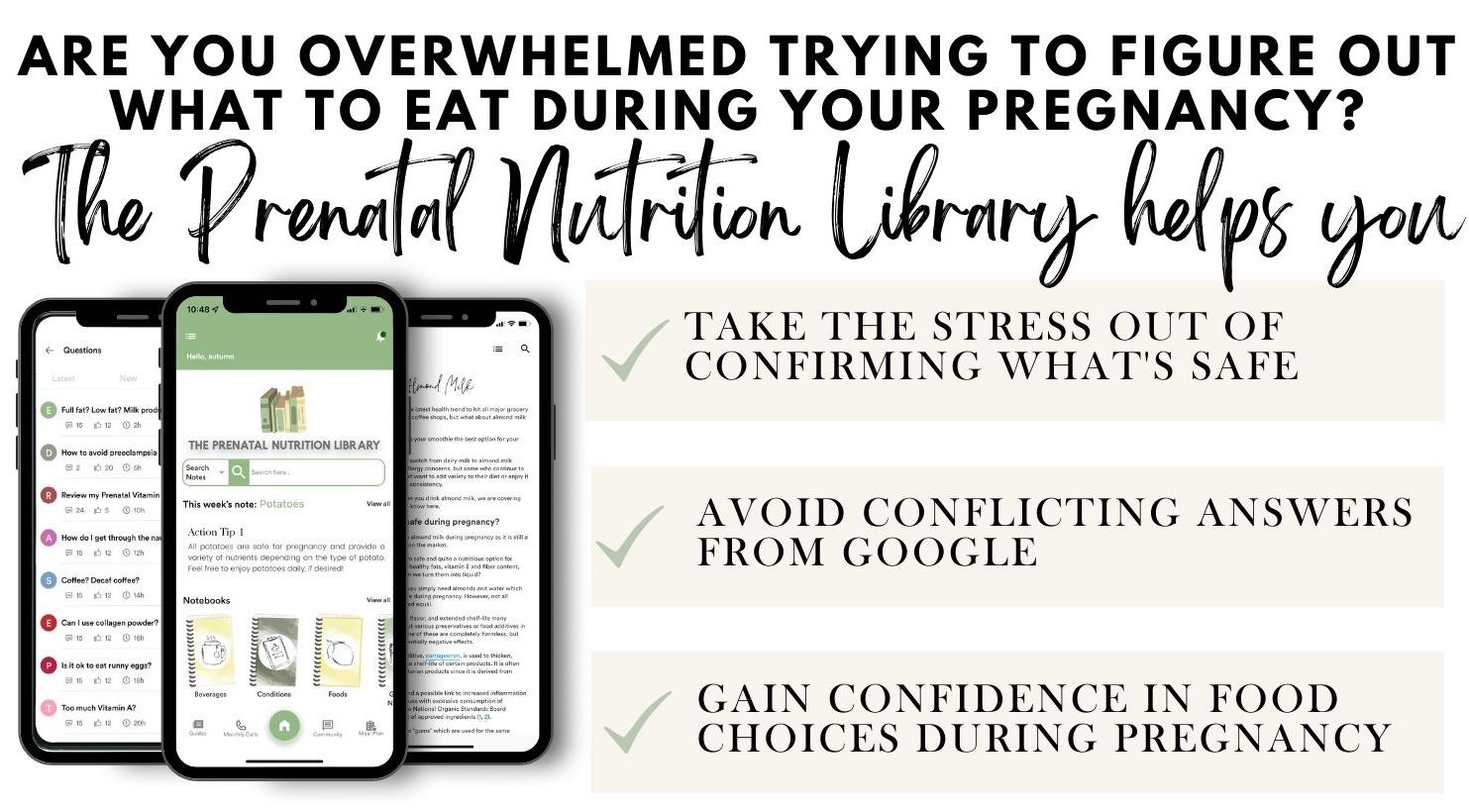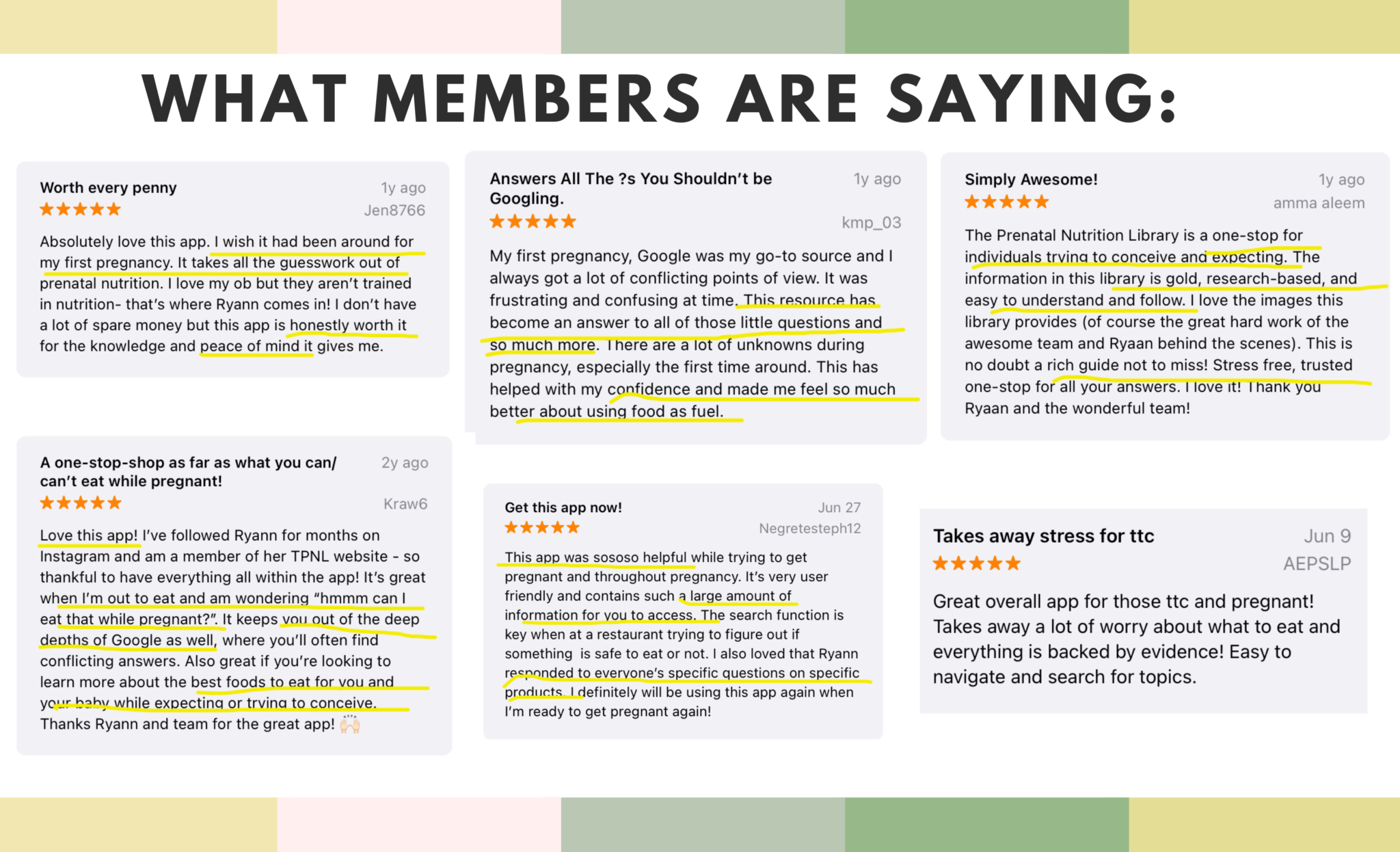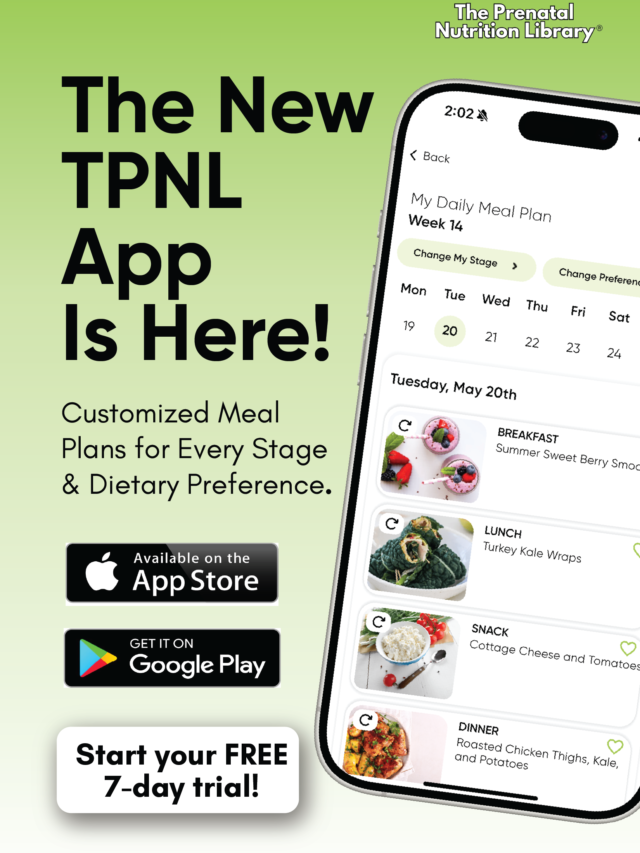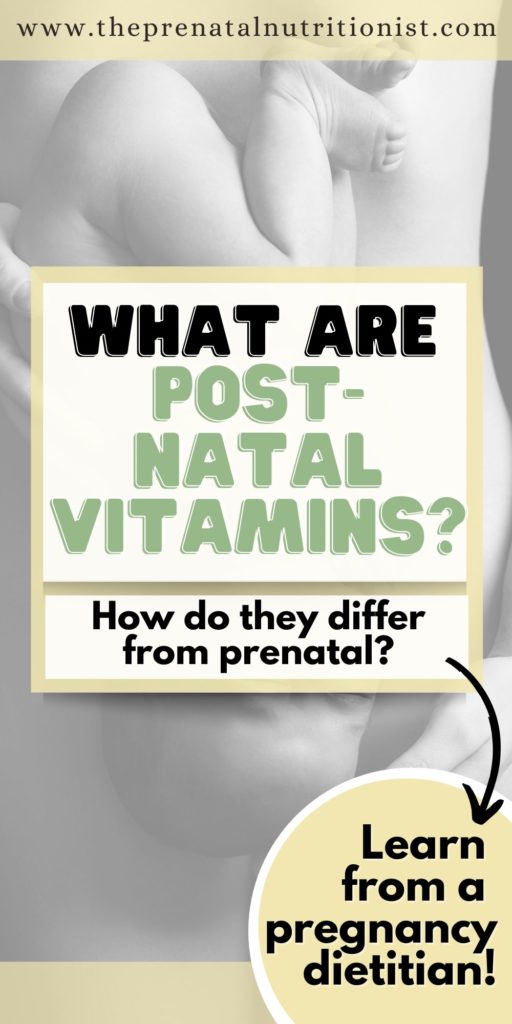
A lot of rest and, eventually, pelvic floor exercises support postpartum healing and recovery. However, good nutrition is also crucial. Prioritizing nutrition after childbirth is just as important as it was during pregnancy. This is true whether you are breastfeeding or not. Several nutrients play a role in helping you recover, replenish, and prevent nutrient deficiencies during postpartum.
After giving birth, your body still has heightened nutrient needs. Your hormone levels are changing, and you are recovering. If breastfeeding, your body also works hard to create breast milk to meet your baby’s nutrient needs. These things, and many more, can take a significant toll on your nutrient reserves. While we focus on foods first, it can be challenging to meet the need for all nutrients through foods alone.
That’s why I want to dedicate this post to discussing post-natal vitamins. Let’s chat about what they are if they differ from prenatal vitamins, and why they’re essential to support your health during this important and beautiful time of your life.
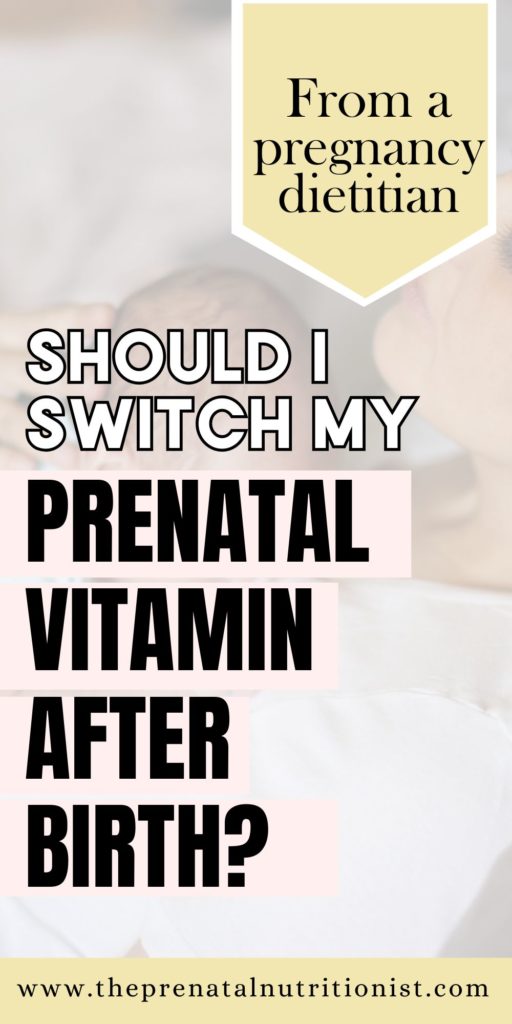
What Are Post-Natal Vitamins?
Postnatal vitamins are multivitamin supplements formulated to support the unique nutritional needs of postpartum and breastfeeding women. They help new mamas replenish the nutrients used during pregnancy and childbirth and support healthy recovery and breastfeeding.
After giving birth, your body needs specific key nutrients to heal and keep up with the nutrient demands of breastfeeding. Luckily, post-natal vitamins can help fill the nutrient gaps, ensuring you get everything you need to support your health and your baby’s well-being.
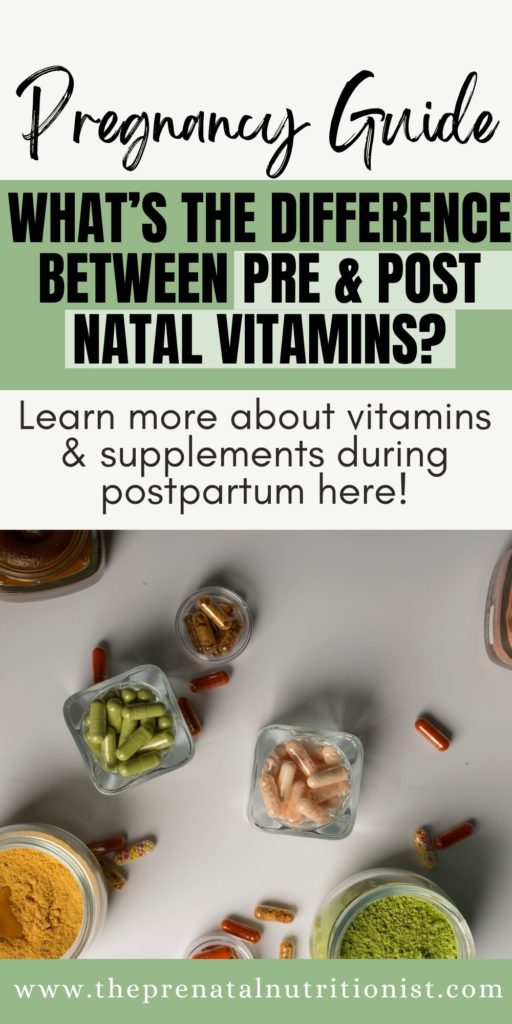
What Is The Difference Between Pre and Post-Natal Vitamins?
There is a lot of overlap between prenatal and postnatal vitamins. Both prenatal and postnatal vitamins typically contain nutrients like folate, calcium, and vitamin D. Sometimes, postnatal vitamins add more iron to account for losses during delivery. Omega-3 fatty acids, especially DHA, may or may not be included in a prenatal or postnatal vitamin but are essential during both periods.
Should I continue with a prenatal vitamin or switch to a postnatal vitamin?
Supplement needs always depend on the person and their specific situation. Variables such as diet, health history, labs, preferences, food allergies, and more should all play a role in supplement recommendations. Most people benefit from continuing with a prenatal or postnatal vitamin during postpartum.
Of course, overall diet is most important. Still, a prenatal or postnatal vitamin can help fill the gaps and keep up with the increased nutrient demands for healing, recovery, and lactation if breastfeeding.
Usually, continuing with the same prenatal vitamins taken during pregnancy will work. However, lab testing to assess for changes in iron, vitamin D, and mineral status can help to identify if a change would be beneficial. If you’d prefer to switch to a postnatal-specific vitamin, that’s fine. However, it should ideally include third-party, activated b-vitamins, magnesium, and choline, just like a high-quality prenatal vitamin.
Fewer quality postnatal-specific vitamin options exist, and a quality prenatal vitamin coupled with a nutrient-rich diet will help you meet nutrient needs during postpartum. So, switching and choosing a postnatal vitamin or continuing your prenatal vitamin after delivery is ultimately up to your personal preference and needs.
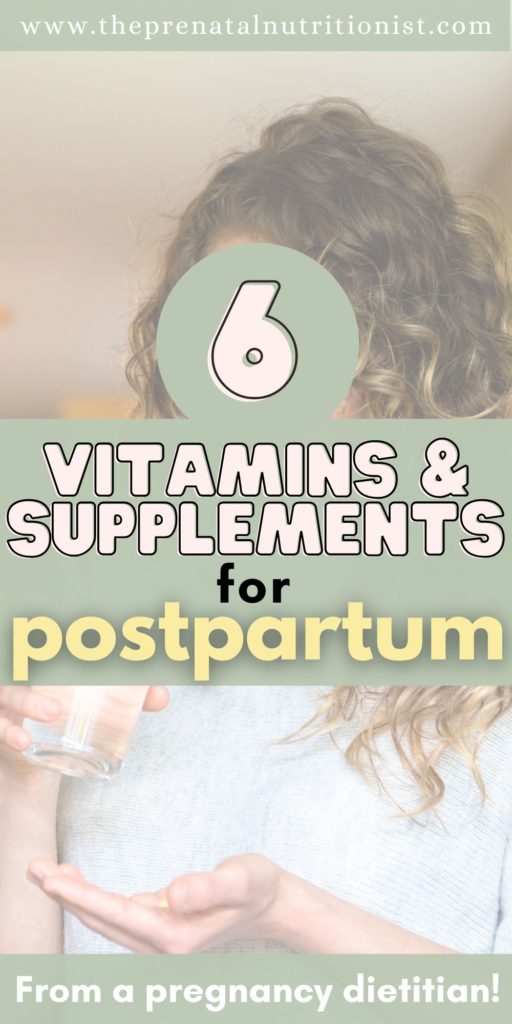
What Are The Best Post-Natal Vitamins?
As mentioned above, it’s important to remember that supplement needs are individualized. There’s no one “best choice” for every person. Ideally, everyone should choose an option that is third-party tested for purity and quality of ingredients. Additionally, some options are more well-rounded and higher-quality. Let’s take a look at a few good options!
Comprehensive post-natal vitamins for postpartum and breastfeeding.
Full Well Prenatal Vitamin
Several nutrients have even higher demands during breastfeeding than they were during pregnancy. This quality prenatal vitamin is a popular choice for breastfeeding moms because it contains a comprehensive blend of nutrients that help meet the mother’s and baby’s needs while breastfeeding. The formula includes iodine, essential for thyroid health, and folate, which can help with energy levels and prevent anemia.
Calcium and vitamin D are also featured here and are essential for bone health. The active forms of B vitamins support energy. With consistent use, they can help you meet nutrient needs, replenish, and prevent nutrient deficiencies while postpartum and breastfeeding.
Thorne Basic Prenatal Vitamin
This vitamin is a go-to option for those low in iron after pregnancy and delivery. Be sure to get an iron panel done after pregnancy to determine your individualized iron needs because everyone is different. Thorne Basic Prenatal Vitamin also includes activated B vitamins, choline, selenium, iodine, and active vitamin A.
One con of this choice is that it is low in magnesium. Magnesium is important for postpartum, maintaining hydration, stress and sleep support, and more. If you choose this for your postnatal vitamin, be sure you’re getting sufficient magnesium elsewhere in your day.
Post-natal supplements for hair loss support.
Perfect Desiccated Beef Liver Supplements
For most, postpartum hair loss is unavoidable. It’s both common and normal due to hormonal shifts. However, sometimes excessive hair loss can indicate thyroid dysfunction or nutrient deficiencies. Additionally, several nutrients support hair health and growth, including B vitamins, omega-3s, vitamins A, D, E, and K, zinc, and selenium.
Including a few ounces of liver in your diet each week could be a great option. If not, a dedicated beef liver supplement is a good source of several key nutrients mentioned above and may be helpful during this season. Double-check other supplements you are taking to ensure no nutrients, like retinol (vitamin A), are being overdone.
Needed Sleep and Stress Support
Stress is thought to be a significant contributing factor to hair loss. It’s an inevitable part of life, especially with a newborn, but managing stress better can help your physical and mental well-being. Additionally, studies have found that those with sleep disorders, sleep apnea, and insomnia have an increased risk of hair loss.
Prioritizing stress management and optimizing sleep as best you can. For example, limit blue light exposure in the evening and get sunlight during the day. This Sleep and Stress Support supplement from Needed may help provide extra support for some individuals.
Click here for a discount and use code RYANN!
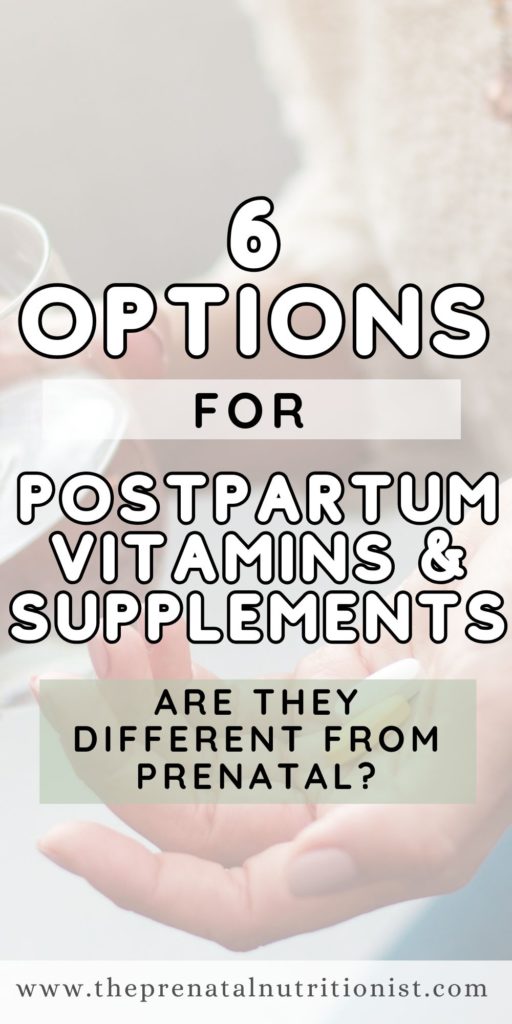
Post-natal supplements for energy and mood support.
Nordic Naturals DHA
Not only are omega 3’s important for your baby’s brain development, but for your mental wellbeing. Many studies support omega-3s as having an overall significant beneficial effect on perinatal depression, and omega-3s significantly improve depressive symptoms in perinatal women regardless of pregnancy or postpartum. They are also well tolerated.
Get your omega-3s by eating seafood 2-3 times per week postpartum. Specifically, fatty fish like salmon, herring, sardines, and anchovies in your weekly seafood rotation. Consider a supplement, like Nordic Naturals DHA, if you are allergic or do not regularly consume seafood in your diet.
Needed Cognitive Support
Postpartum brain fog is very commonly reported among postpartum mothers. It refers to cognitive symptoms that women experience after giving birth, including forgetfulness, difficulty concentrating, and feeling scatterbrained. Key nutrients to support cognitive function include omega-3s, choline, magnesium, B vitamins, vitamin D, iron, and protein.
The Needed Cognitive Support supplement for postpartum and breastfeeding includes key nutrients and adaptogens to support mental clarity, focus, and energy levels. If you battle brain fog symptoms, adding to your comprehensive prenatal or postnatal vitamin could be a good option.
Click here and use code RYANN when you check out!
There’s no one best post-natal vitamin choice; choose what meets your needs and preferences!
Picking your postnatal vitamin is similar to finding which prenatal vitamin is the best for you. Often, continuing with the same prenatal vitamin is appropriate. But, if you’re sick of all the guesswork and navigating what you need before, during, and after childbirth on your own, join The Prenatal Nutrition Library app!
No more guessing or confusion. All the answers are where you need them when you need them! The Prenatal Nutrition Library (TPNL) is the first and most comprehensive searchable library of preconception, pregnancy, and soon-to-be postpartum and breastfeeding nutrition information. Complete with stage-specific meal plans, a private podcast, and an Ask the RD (dietitian) feature! Join us today!



